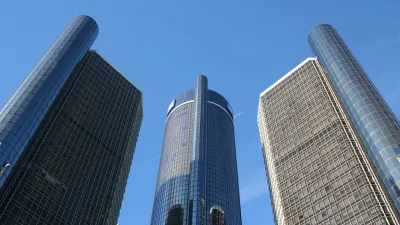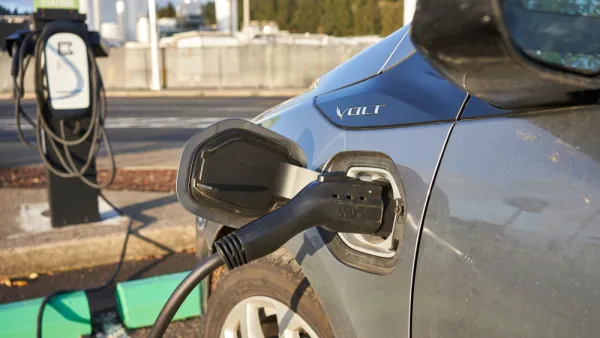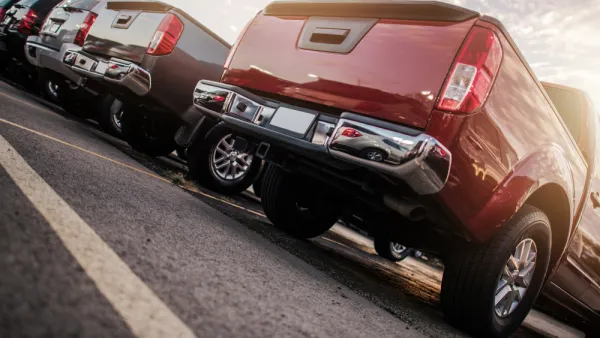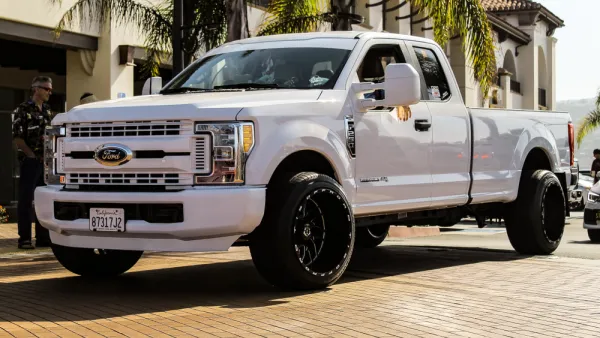General Motors cut the bad environmental and economic news with an announcement that cost cutting measures would allow the company to focus more resources on electric and self-driving cars.

[Updated Nov. 27, 2018]
Nathan Bomey reports for the USA Today:
General Motors is killing several passenger cars, including the Chevrolet Volt and Chevrolet Cruze, two compact vehicles that were held up as examples of the automaker's post-bankruptcy revival.
The move — part of a sweeping cost-cutting plan unveiled Monday — comes as Americans are abandoning passenger cars in favor of crossovers, SUVs and pickups.
The company hopes to cut $6 billion in costs in all, according to Bomey.
While this article focuses more on the business and consumer interest in the news, other stories took a different angle toward the story, including another article by Bomey on the five plants that would be closed in the United States and Canada.
"The Detroit-based automaker said it would end production by the end of 2019 at its Lordstown Assembly plant in northeast Ohio, its Detroit-Hamtramck Assembly plant in southeast Michigan, its Oshawa Assembly plant in Ontario, its Baltimore Operations parts plant in Maryland and its Warren Transmission Operations plant in southeast Michigan," according to Bomey. This part of the story prompted an angry response from President Trump.
John Gallagher followed up on news of the plant closures with an article about the controversial history of the Detroit-Hamtramck Assembly plant, which displaced the historic neighborhood of Poletown when it was constructed.
It's fair to say that Poletown-type seizures had already lost in the court of public opinion. Critics had long claimed that GM's Hamtramck plant never delivered the jobs and economic spin-offs that justified the razing of the Poletown neighborhood. Such complaints were one factor in voters' approval of even tighter restrictions on eminent domain in a 2006 ballot referendum called Proposal 4.
Finally, the media also focused on the environmental consequences of the company's downscaling. Aditi Shrikant writes for Vox and sets a pretty drastic pivot from the points discussed above:
GM’s shuttering of plants is also a step toward its new focus on producing electric and autonomous vehicles; its new motto is “Zero Crashes, Zero Emissions, Zero Congestion.” In 2017, the company bought Cruise Automation, a San Francisco-based driverless car company. According to a press release, “resources allocated to electric and autonomous vehicle programs will double in the next two years.”
Shrikant's coverage provides more details of the political fallout of the decision, collecting the Twitter responses of local, state, and federal political representatives in area's impacted by plant closures.
Finally, Henry Grabar is the first to write skeptically in response to the notion that GM's changes have the best public outcomes in mind. Instead of a sober approach to operation, or a new commitment to efficient vehicles, the decision is mostly, "a response to Americans’ burgeoning love for pick-ups and SUVs," according to Grabar.
Giving Americans what they want has consequences, like worsening pedestrian safety outcomes and stalled fuel efficiency progress.
Update: A few more stories of interest to consider all sides of the GM news:
- Chevy Volt was going to save Detroit. Now its workers are losing jobs (USA Today via Detroit Free Press, Nov. 27, 2018))
- An older article that predicted problems for GM last year: Auto slowdown flashes caution lights for manufacturing employment — and Trump (Brookings, June 19, 2017)
FULL STORY: GM to kill Chevrolet Volt, Cruze, Impala as Americans ditch passenger cars

Analysis: Cybertruck Fatality Rate Far Exceeds That of Ford Pinto
The Tesla Cybertruck was recalled seven times last year.

National Parks Layoffs Will Cause Communities to Lose Billions
Thousands of essential park workers were laid off this week, just before the busy spring break season.

Retro-silient?: America’s First “Eco-burb,” The Woodlands Turns 50
A master-planned community north of Houston offers lessons on green infrastructure and resilient design, but falls short of its founder’s lofty affordability and walkability goals.

Test News Post 1
This is a summary

Analysis: Cybertruck Fatality Rate Far Exceeds That of Ford Pinto
The Tesla Cybertruck was recalled seven times last year.

Test News Headline 46
Test for the image on the front page.
Urban Design for Planners 1: Software Tools
This six-course series explores essential urban design concepts using open source software and equips planners with the tools they need to participate fully in the urban design process.
Planning for Universal Design
Learn the tools for implementing Universal Design in planning regulations.
EMC Planning Group, Inc.
Planetizen
Planetizen
Mpact (formerly Rail~Volution)
Great Falls Development Authority, Inc.
HUDs Office of Policy Development and Research
NYU Wagner Graduate School of Public Service




























